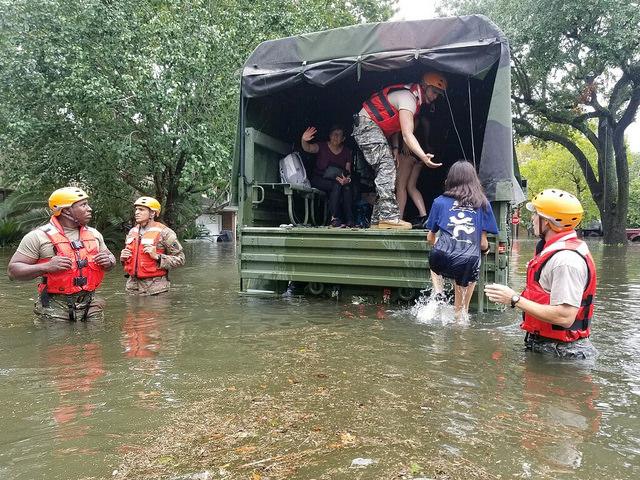As emergency responders and health officials continue to battle displacement and injuries after Hurricane Harvey and the resulting catastrophic flooding continue to batter Texas, some authorities are urging residents to get a tetanus shot as a necessary precaution.
US Rep. Pete Sessions (R-Tex.) said on CNN on Aug 28 that residents should get a tetanus shot before they wade into waters. And a report from National Public Radio (NPR) said Texas officials had already begun filling requests for tetanus vaccinations and sending supplies of the vaccine to affected areas.
But this advice could be misconstrued at best, and wasteful of public health resources at worse. Experts are warning against offering tetanus shots to those who don't need them.
Routine vaccinations sufficient
"Routine boosters are sufficient," said Chris Van Deusen, director of media relations for the Texas Department of State Health Services (TDSHS). "We're anticipating possible requests for vaccine for unvaccinated people."
Today the TDSHS drafted guidance on immunization recommendations in a natural disaster.
"The major concern for anyone exposed to unsanitary conditions is that they be up to date with tetanus-containing vaccine, because if they are injured (as is common in disaster settings) the injury is likely to be contaminated," the guidance states. "If a person receives a puncture wound or a wound contaminated with feces, soil, or saliva, a doctor or health department should determine whether a tetanus booster is necessary based on individual records."
Currently the standard recommendation for adults is a tetanus shot every 10 years, and Td (tetanus/diphtheria) or Tdap (tetanus/diphtheria/pertussis) vaccine can be used. Guidelines for children are more complicated: The Centers for Disease Control and Prevention (CDC) recommends a series of four shots administered between 2 and 18 months, a booster shot at ages 4 to 6, and another by age 12.
If someone is behind on boosters, it's important to get updated, regardless of recent exposure to floodwater, said public health expert Michael T. Osterholm, PhD, MPH. "But there's no evidence of increased risk of tetanus after flooding," he said. "It would be a mistake to divert important resources during this time toward tetanus vaccination."
Osterholm is director of the University of Minnesota's Center for Infectious Disease Research and Policy, publisher of CIDRAP News. He said the CDC recommendation is very clear on the issue.
CDC press officer Kristen Nordlund told CIDRAP News, "Exposure to flood waters does not increase the risk of tetanus, and tetanus immunization campaigns are not needed. Each state and local health department can determine what is best for their evacuees after any given disaster, including in terms of vaccination efforts."
"Being up to date with your tetanus vaccine is the best tool to prevent tetanus," she added. "Protection from vaccines, as well as a prior infection, do not last a lifetime. This means that if you had tetanus or were vaccinated before, you still need to get vaccinated regularly to keep a high level of protection against this serious disease. Tetanus vaccines are recommended for people of all ages, with booster shots recommended every 10 years."
But any wounds suffered during disaster cleanups should be taken seriously, added Tom Skinner, a CDC spokesman. "If you experience a wound injury and you're unsure of your vaccination status, it's a good idea to get vaccinated," he said
The idea that flooding, and the accompanying floating sharp objects, increase the risk of tetanus is an old wife's tale, Osterholm said. In fact, puncture wounds experienced during a flood may be less likely to cause harm than those experienced in dry conditions, he said, because the Clostridium tetani spores have already been sporulated in the water.
Risk comes in recovery period
Texas continues to experience the disaster period in the immediate aftermath of historic flooding, said Kathleen Schrank, MD, of the University of Miami School of Medicine. Schrank said she saw a frantic run on tetanus shots 25 years ago, after Hurricane Andrew made landfall in Florida.
"One week into recovery is when everyone wanting a shot comes into clinics and hospitals, saying, 'I need a shot now; I want to clean up my yard,' " said Schrank. "That's not what clinics and urgent care need to be dealing with at that time."
Schrank said that if someone is seeking urgent or emergency medical care for a wound, they will be asked about tetanus status and offered a shot if the patient can't remember when he or she last got a booster. But in non-emergency situations, the risk of contracting tetanus is extremely low.
See also:
Aug 30 TDSHS news release on post-Harvey health precautions
Aug 28 The Hill story
CDC Worker Safety After a Flood Web page
Aug 28 NPR story





















